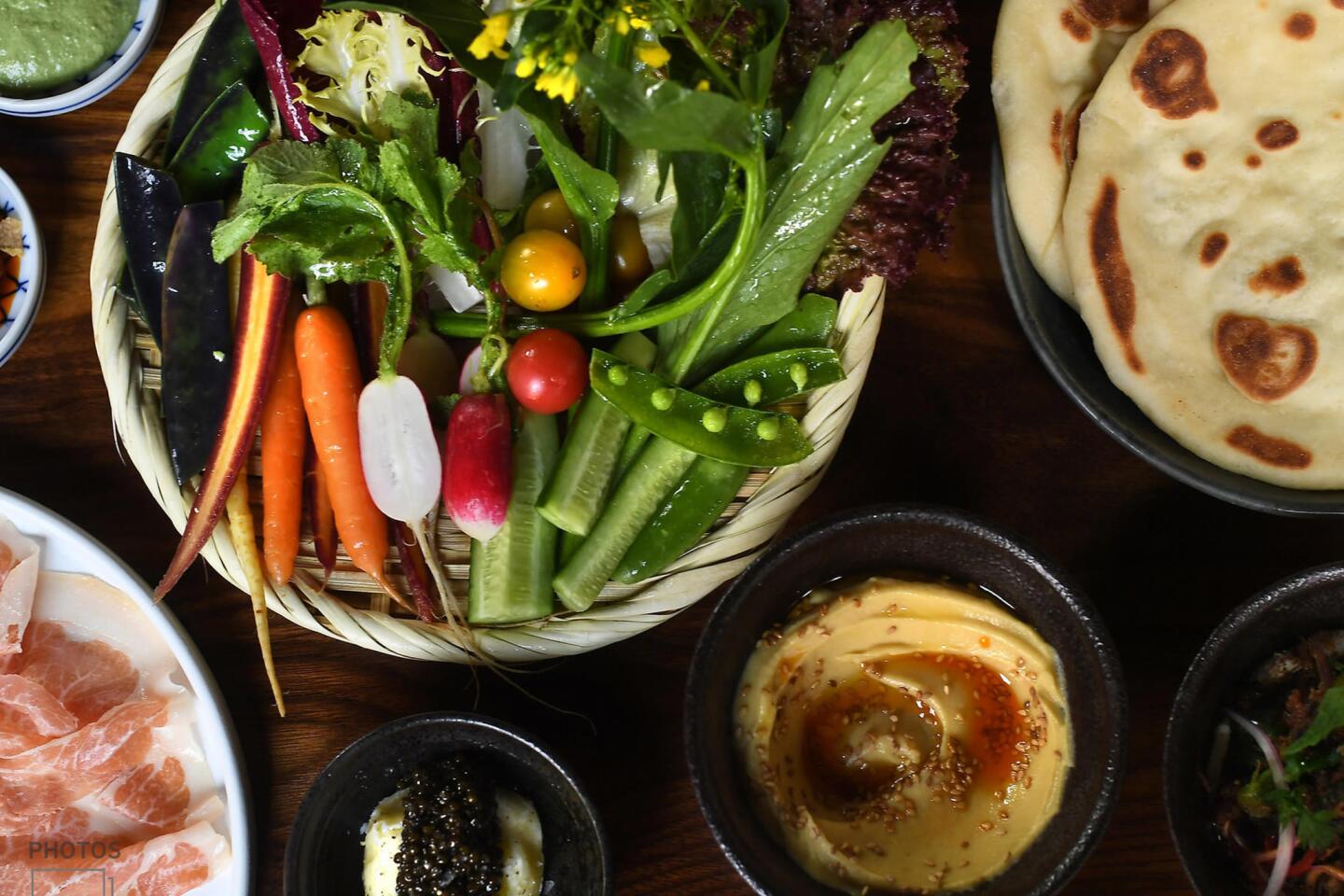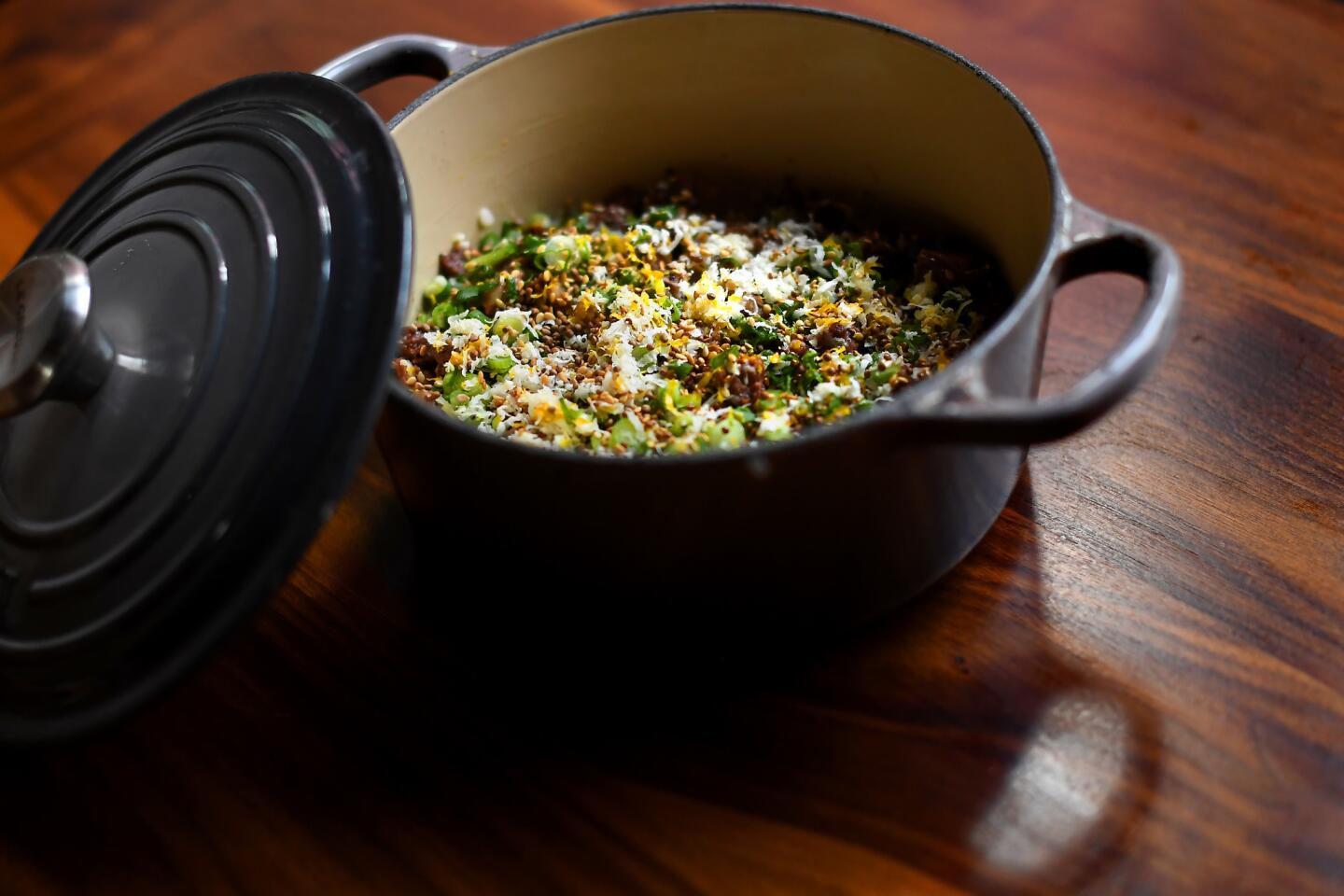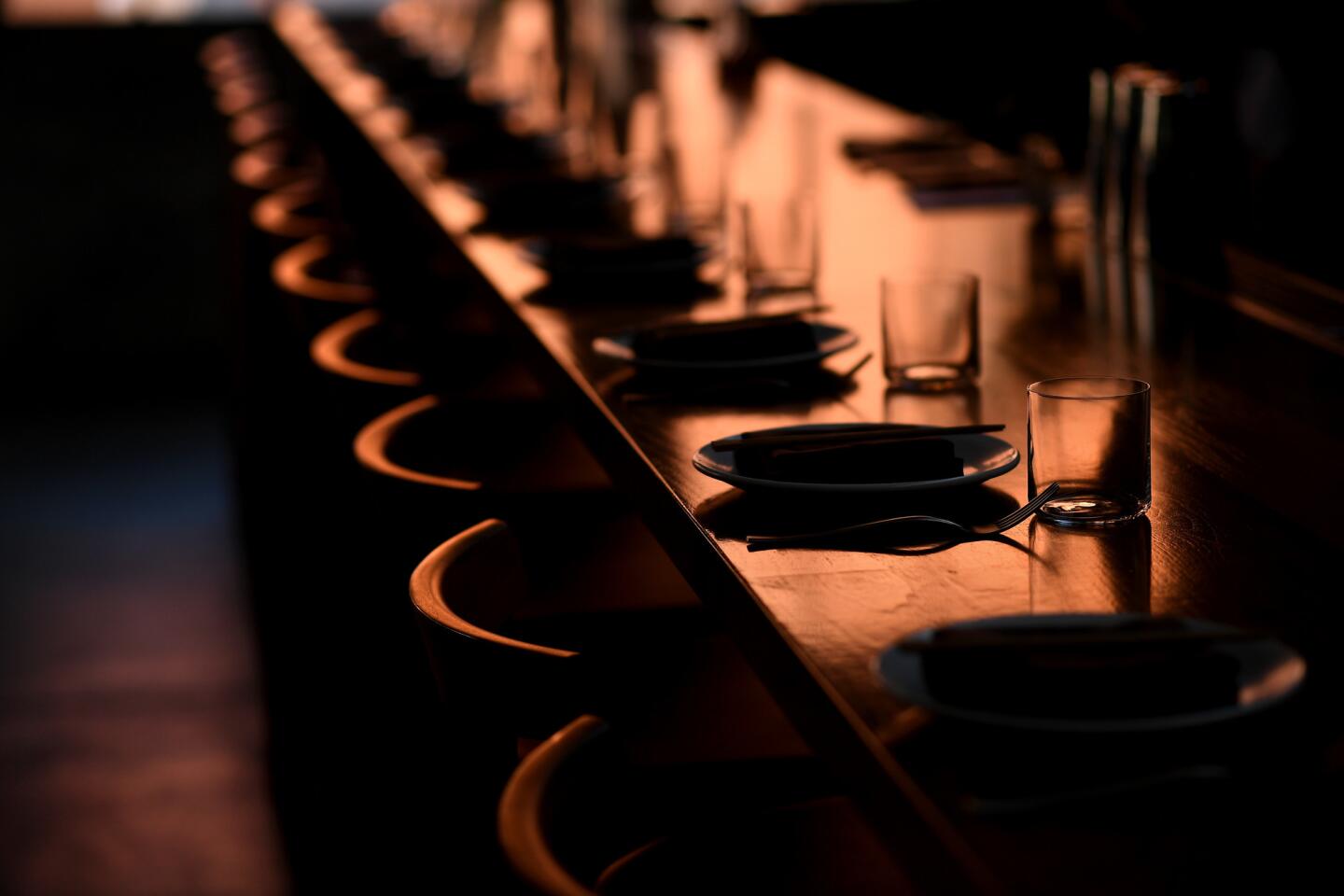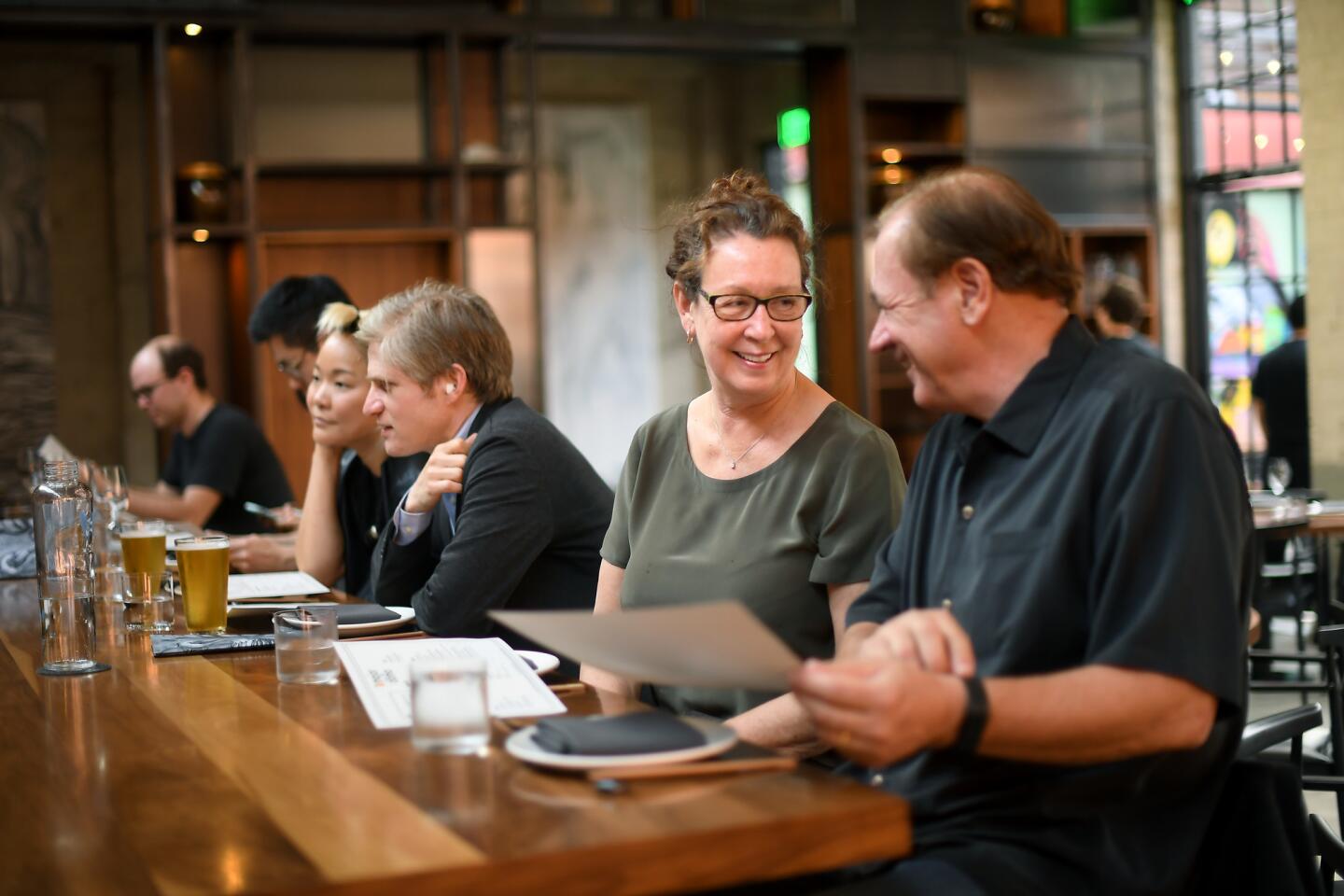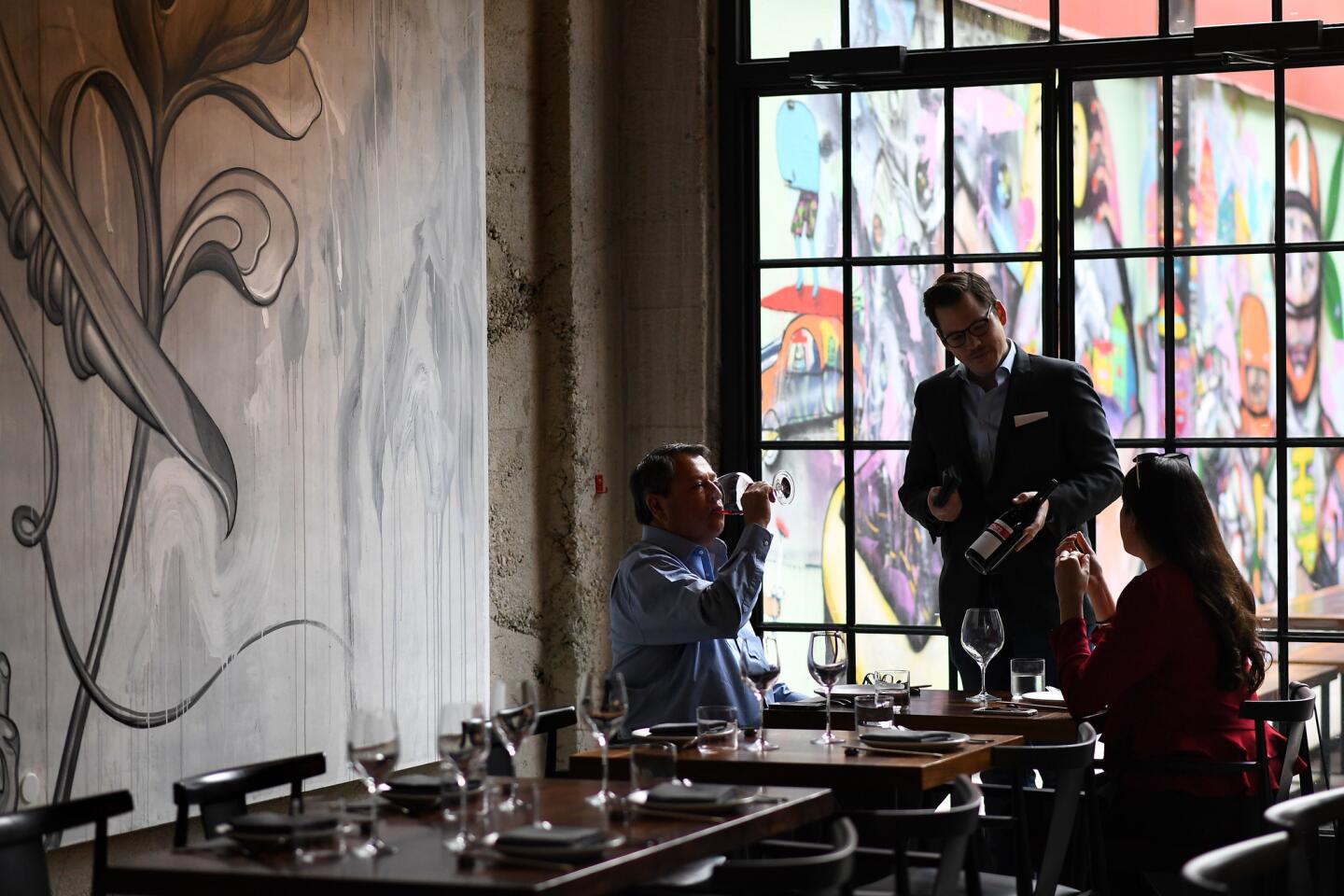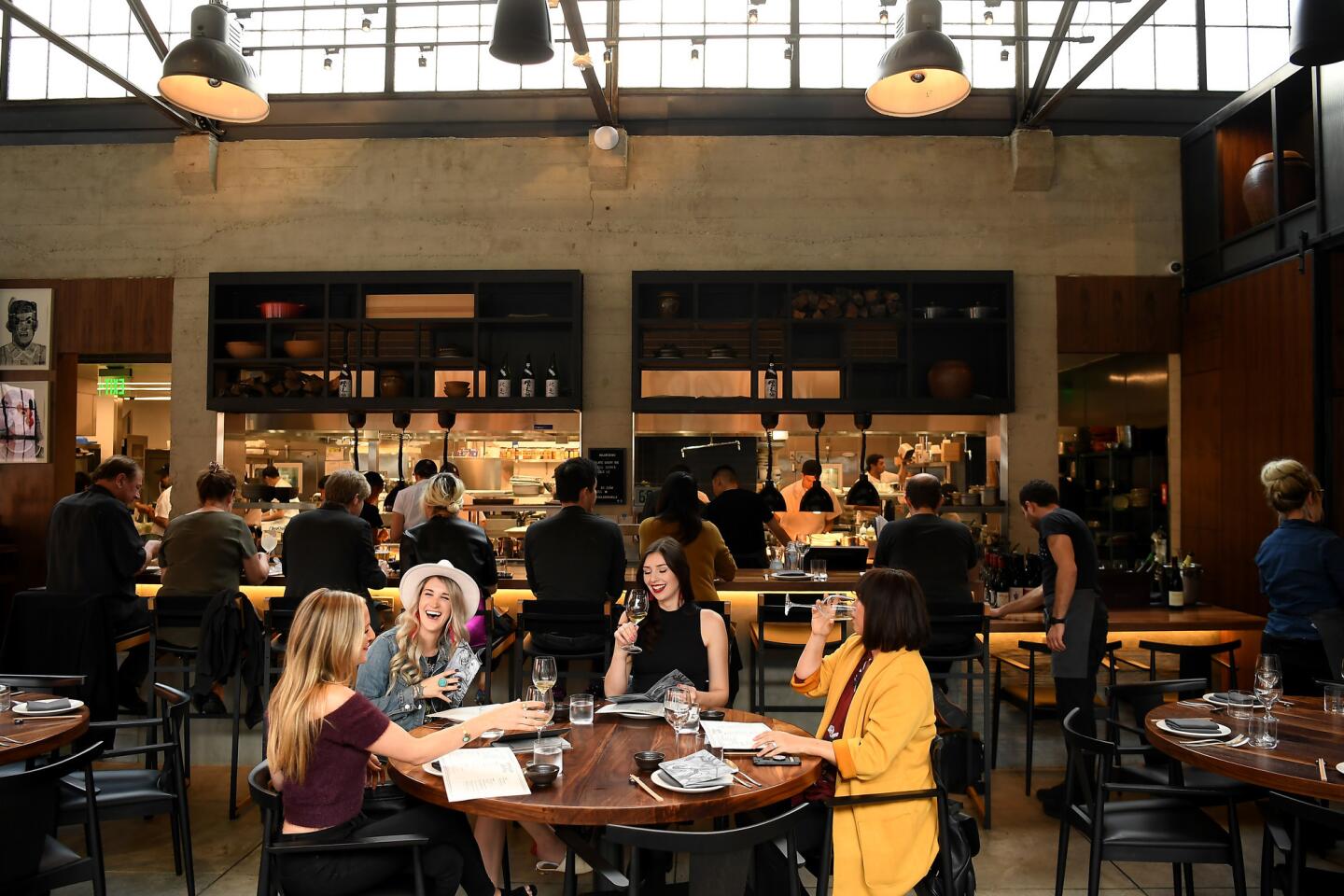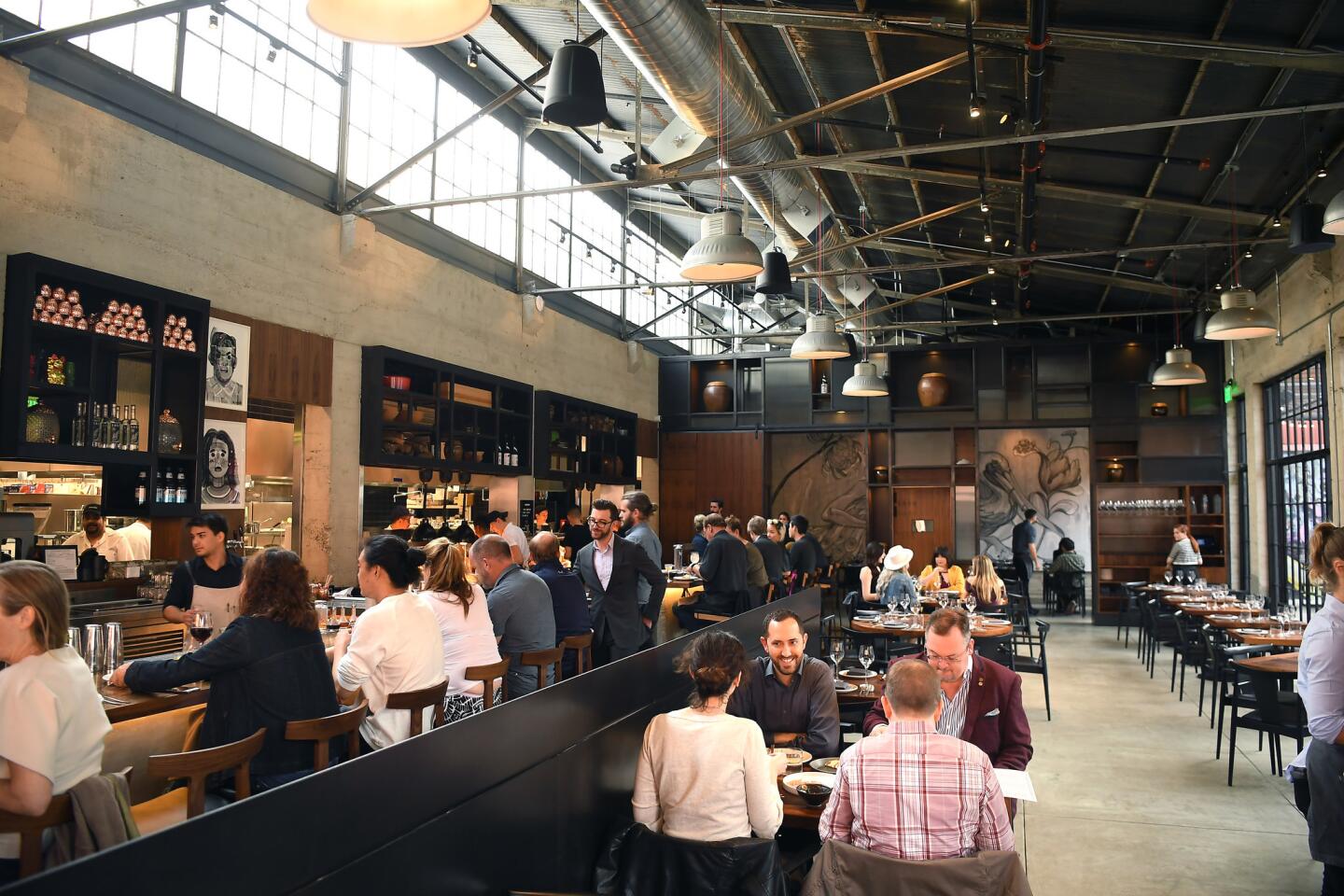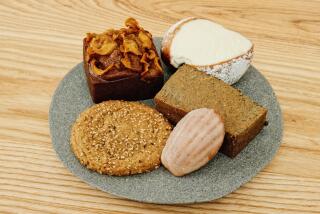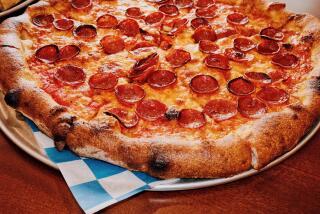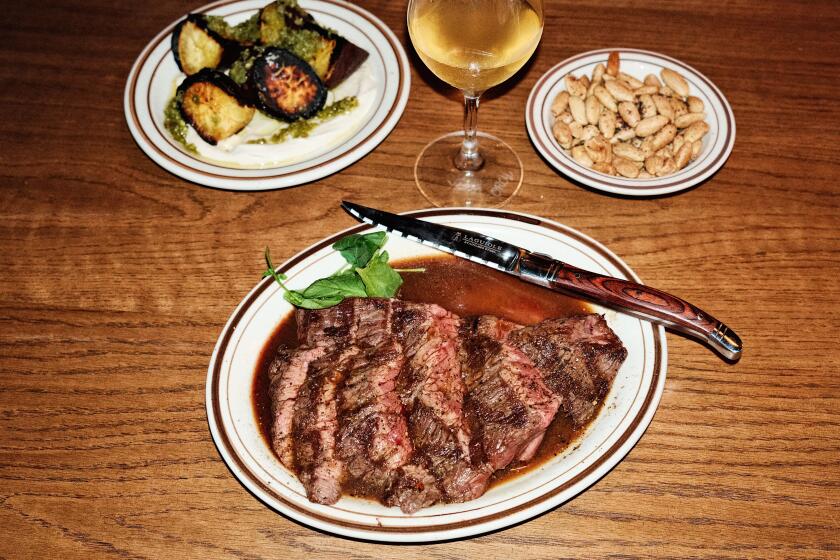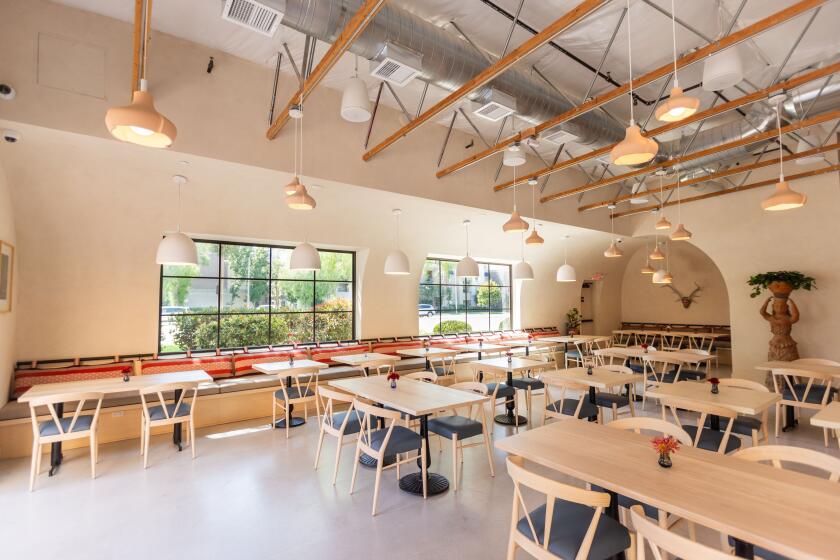Review: At Majordomo, Jonathan Gold is unsure whether to praise chef David Chang — or bury him
That fuming, blackened haunch of meat you see on half the tables at the new Majordomo — that’s the whole plate short rib, a massive cut rubbed with spices, slapped into a smoker for the better part of a day, carved into elegant slices tableside, and served with enough fermented Korean sauces, herbs and wrappers to feed four starving carnivores. The peppery formula was inspired by barbecue god Adam Perry Lang, whose initials appear on the menu, but the dish, a shotgun marriage between the barbecue traditions of Texas and Korea, is all David Chang. A few bourbons and an excellent plate of beef-fried rice made with the leftovers may help you forget the $190 that the short rib costs. Then again, they may not.
If you were going to put a name to Chang’s aesthetic, which seems to be ruling the food world at the moment, it could be something like Cracked Perfection: the way of the shokunin, a Japanese craftsman whose bliss comes through the search for mastery, tempered with an all-American restlessness that keeps that mastery from being achieved. Chang’s style is a vividly flavored and willfully eclectic mash-up of traditional Asian cooking, modern European fine dining, and touches of bling, with flaws so evident that they announce themselves more as features than as bugs. When the kitchen is on point — that succulent short rib — the flaws (imperfectly rendered fat) can make a dish human, and thus compelling. When executed poorly (a gummy mass of vermicelli and shellfish that is presumably a riff on the Korean noodle dish japchae), his dishes just sing out of key.
Is this review a hard one to write? It is indeed. Chang’s vision is everywhere and nowhere. And if I were going to be frank about these things, the disclosure statement alone might take up this entire column. I appear in Chang’s Netflix show, and he has a moment in a documentary about me, which also includes a scene shot in his soon-to-close New York restaurant Má Pêche. His number isn’t in my phone, but we’ve dined together at group dinners in Copenhagen, New York, Los Angeles and Sydney, Australia. He once tried to get me to denounce Filipino cuisine in front of a roomful of his (non-Filipino) friends. I once tried to punk him by taking one of his chefs out to a K-town bossam restaurant when she visited, and she didn’t quite recognize that the delicious dish she was eating had anything to do with the most famous preparation at Ssäm Bar, the restaurant where she worked.
Also, for the last several months I have been furious at the chef for dismantling Lucky Peach, a splendid food magazine created by him and Peter Meehan that I truly loved and wrote for. As I’ve said, it’s complicated — I’m not sure whether I’m here to praise Caesar or to bury him.
Majordomo, Chang’s 15th restaurant and the first in Los Angeles, is a massive new place squeezed between a soy sauce importer and the Los Angeles River, in a corner of Chinatown you likely haven’t visited unless you are a fan of the EDM events that sometimes pop up under the Spring Street viaduct. The restaurant occupies a glassed-in warehouse just off an improvised plaza decorated with Christmas lights.
A reservation is basically impossible to snag at this point — the website, which takes bookings precisely a month in advance, will announce zero availability when you get around to clicking on it — and the line for bar seats and walk-ins forms long before the restaurant opens at 5:30. On a recent Saturday, it was difficult to sort out the Majordomo-bound from the people bound for a nearby Carl Cox DJ party. I’m not sure the Venn diagram of the two crowds neatly coincided, but I’m guessing that at least some of the people in the long restaurant line decided to peel off and go dancing instead.
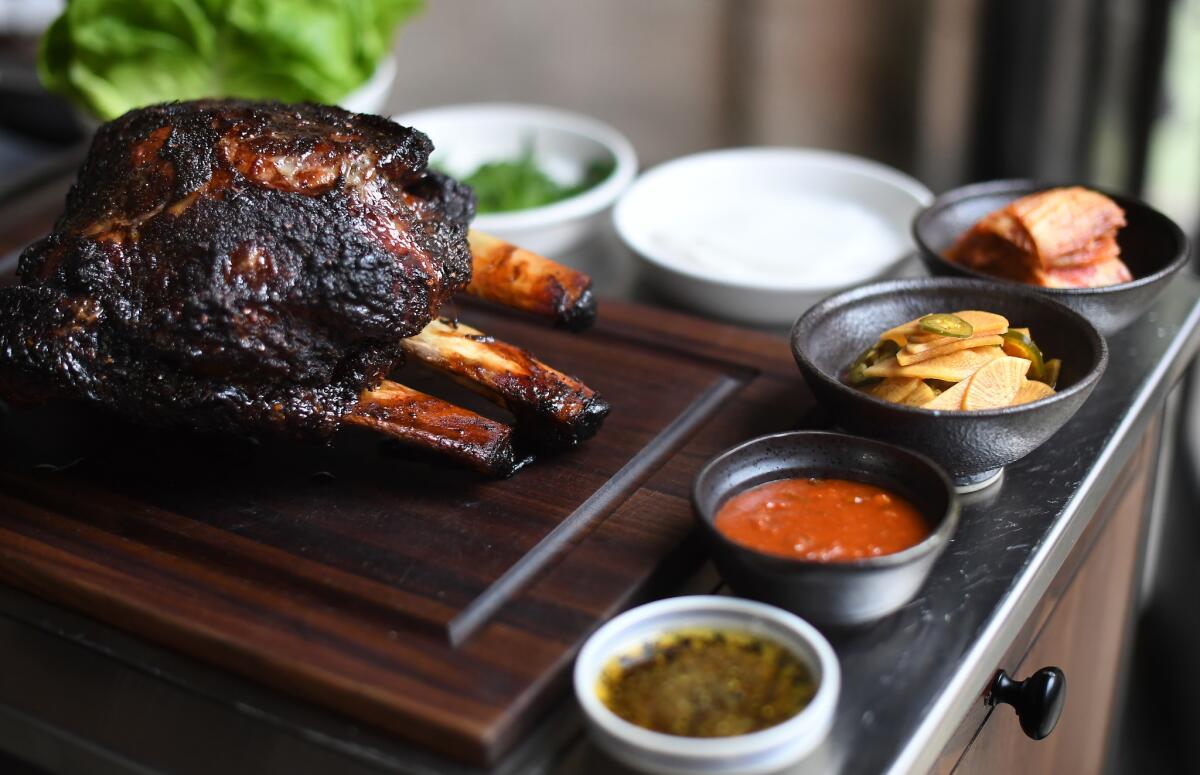
Like most ambitious chefs coming to Los Angeles for the first time, Chang seems overwhelmed by the moreness of it all: the splendid produce and the deep cultural foodways, the culture of hard partiers who tend to go home early, and the large number of customers whose idea of bicoastal involves Tokyo or Seoul rather than New York. In New York, it’s difficult to get away with gummy quenelles de brochette. In L.A., the cumin lamb had better be on point, because there are three dozen Xinjiang grills in the San Gabriel Valley ready to take you down if it isn’t.
As at Ssäm Bar, the New York restaurant that cemented Chang’s place in the food world, the Majordomo menu draws from the Korean dishes he grew up eating, but in Los Angeles they seem less abstracted: closer to the original. You can eat something like a pure Korean meal here.
Still, if you go to Majordomo hoping to taste something like Koreatown cooking with the umami cranked to 10, you may be confused.
Your first taste, Chang’s take on the Korean pickle dongchimi, will be delivered in a tiny black saucer, served from a wooden cart: slivers of quick-cured radish and pear floating in a sip or two of fizzy brine, barely sweetened with what I suspect is a bit of 7 Up or Sprite. On the Thanksgiving episode of “Ugly Delicious,” Chang talks a bit obsessively about the hack. This is not an uncommon way to start a meal in Koreatown — the version at the Wilshire Boulevard Gangnam import Gwang Yang is especially good — but this version lacks the punch, the sweetness of the best K-town versions.
Your first time there, you will probably order the jumeokbap, which is to say a mound of rice seasoned with seaweed and egg like the dosirak at Kang Ho Dong Baekjeong, but instead of shaking the mixture together in a lunchbox, you slip on plastic gloves and mold the hot rice into fist-size rice balls.
There is a take on the pasta with butter, black pepper and hozon, a mild yet umami-rich fermented chickpea paste shipped from Momofuku’s lab in New York. When the dish was served as “ceci e pepe” at Nishi, Chang’s proto-Italian restaurant in Chelsea, it was savaged by the food press — fermented chickpeas don’t taste much like pecorino Romano, even if their salt profiles are pretty close — but renamed and taken on its own terms, the pasta is actually good; something you might see on a modernized Middle Eastern menu, but with a ton more black pepper.
SIGN UP for Jonathan Gold’s Counter Intelligence dining newsletter >>
An entire section of the menu is dedicated to bing, the kitchen’s rough equivalent of the rough Chinese flatbread, served with any number of things — transparent slices of country ham from Tennessee’s Benton’s, a smokehouse Chang has long favored; smoked fish roe and scrambled eggs; maple butter; a paycheck’s worth of sea urchin; or a little bowl of that hozon. But bing, whether studded with green onions in Shandong or glazed with egg in Shanghai, is a pretty specialized entry in the world of flatbreads, crisp and chewy, with an oily flake when you pull it apart to stuff with sliced beef or drag through a puddle of chile oil. Chang’s version, mottled like a pancake griddled with a bit too much oil, is almost pudding soft — not bad, but also not quite what I was expecting.
There is a bland, tepid version of galbi jjim, the grandmotherly Korean short rib stew that is a standard on both homestyle menus and at the turbocharged Sun Nong Dan, a Koreatown restaurant Chang has been known to visit more than once in a day. Simmered long and slow with herbs and aromatics, galbi jjim can be a miracle of softness and sweet complexity. It may be served in restaurants, especially modest ones, but it is essentially a home dish, the kind of thing a grandmother might spend an entire afternoon coaxing into life. Majordomo’s galbi jjim isn’t terrible — it would probably sneak into any list of the top five restaurant versions in town — but it isn’t transcendent either; the meat too tough and the braised daikon too soft, the flavor slightly muddy and indistinct.
At Sun Nong Dan, the baller touch is a handful of mozzarella sprinkled over the top of the seething galbi jjim and blasted into submission with a blowtorch. The equivalent at Majordomo is the big half-wheel of Alpine cheese whose heat-softened edge is scraped into the stew at table. The spectacle is impressive — a waiter chided us for not taking photos — but ultimately a half-pound of stinking goo may not be what Chang’s mildly seasoned dish needed, and it obliterated the taste of the meat.
But I loved a dish of skate-fried rice that I took as a riff on bibimbap: a slash of spicy gochujang, a scattering of herbs, and a bottom layer of crunchy fried skate wing that doubled for the crunchy rice crust that is always the best part. On a separate plate, another fried skate wing is elegantly served, as if to fool the eye.
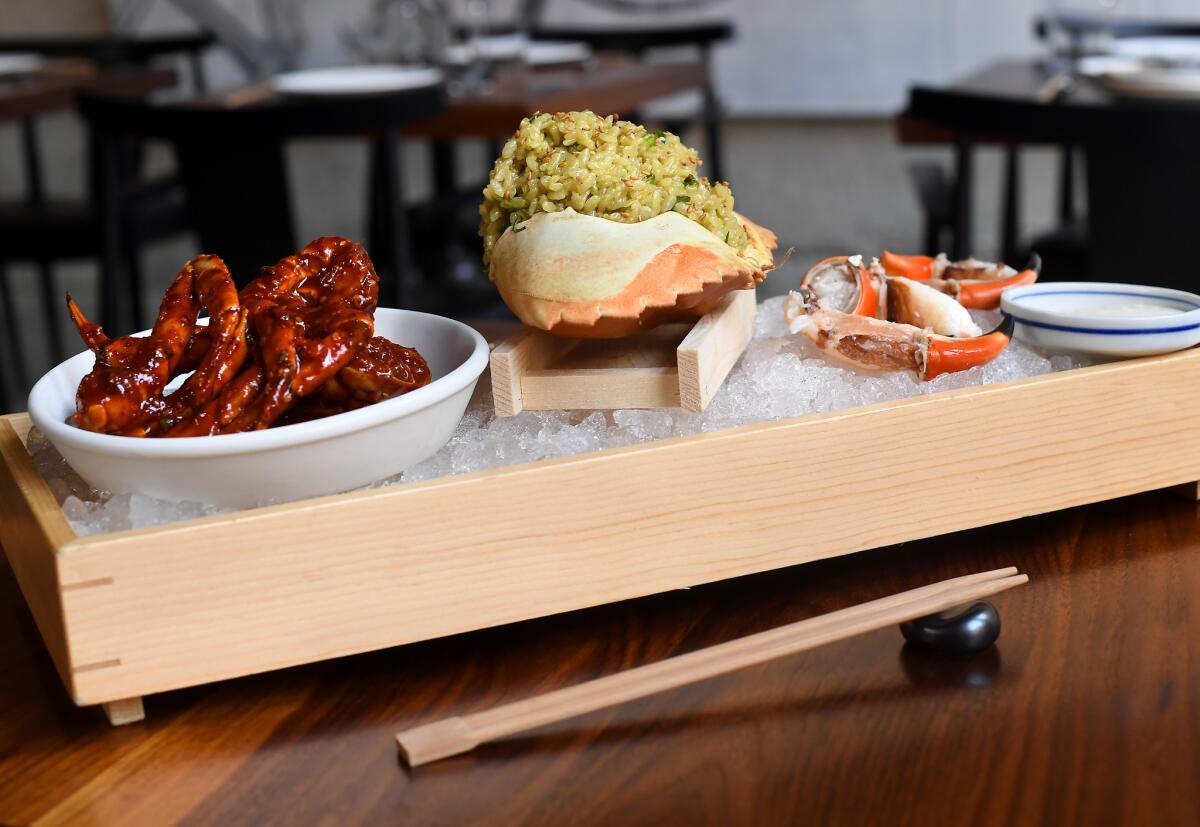
The vegetable dishes, a much bigger part of the menu than at Chang’s other restaurants, are reliably good, whether snips of raw snap peas tossed with grated horseradish, greens served with dipping sauces of house-fermented miso and a Korean-ish fermented bean sauce he calls domojang, or even sweet, Malibu-grown cherry tomatoes seasoned with yuzu and slivers of the herb shiso in a quivery bowl of tofu, like something a talented kappo chef might come up with for early spring.
If you’re in a good mood, you won’t think too hard about the unshelled peanuts he fries with the tiny, spicy butterball potatoes, or the bits of pistachio tossed in with the smoky, delicious marinated mushrooms. You will have worked your way through the almost symphonic progression of the crab-fat fried rice, served in the shell, and its accompaniments. You will be less concerned about the mildness of the Sichuan peppercorns coating the Xinxiang-spiced lamb chops and the almost Provencal herbiness of the big shoulder roast alongside than you will be about what you are going to do with the leftovers the next day, and your physical inability to also handle the bossam (feeds eight), boiled chicken (feeds three) or smoked pork neck. Majordomo’s kitchen is brilliant at engineering pure food lust.
You will instead, unable to eat another bite, stare down an enormous bingsu constructed from barely whipped cream and an enormous cloud of horchata-flavored shaved ice. Either it is going to melt or you will. I’m betting on the ice.
::
Majordomo
Chef David Chang opens his first L.A. restaurant.
LOCATION
1725 Naud St., Los Angeles, (323) 545-4880, majordomo.la.
PRICES
Snacks $10-$15; bing $5-$44; vegetables $12-$17; main courses $28-$38, large format dishes $85-$190.
DETAILS
5:30 to 10 p.m. Mondays through Thursdays; 5:30 to 11 p.m. Fridays and Saturdays. Credit cards accepted. Full bar. Valet parking.
RECOMMENDED DISHES
Raw sugar snaps; marinated mushrooms; fried skate rice; whole plate short rib.
More to Read
Eat your way across L.A.
Get our weekly Tasting Notes newsletter for reviews, news and more.
You may occasionally receive promotional content from the Los Angeles Times.
